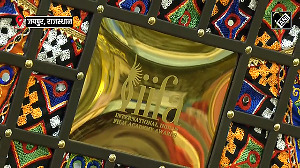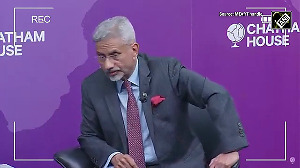Maharashtra goes to the polls on Wednesday, in an election that's widely predicted to result in a hung Assembly. But regardless of whether the Bharatiya Janata Party-Shiv Sena combine or the Congress-Nationalist Congress Party alliance comes to power, the new government will inherit a virtually empty treasury.
The government has been living way beyond its means, its debt is a quarter of the state's gross domestic product, and its expenses on salaries, pensions and interest eat up four-fifths of its revenue receipts.
Yet a decade ago, Maharashtra used to be one of the country's most fiscally conservative states. In 1994-95, when the Shiv Sena-BJP coalition came to power in the state, the government had a revenue surplus of Rs 277 crore (Rs 2.77 billion).
The revised estimates for 2003-2004 show that that surplus has turned into a revenue deficit of Rs 9,037 crore (Rs 90.37 billion), 24.3 per cent of the state's revenue receipts.
Who is responsible for this U-turn in government finances? Was it the BJP-Shiv Sena government, which ruled the state from 1995 to 1999, or is the present Congress-NCP government to blame?
The deterioration started during the BJP-Shiv Sena rule. By the time that government left office, the revenue deficit had ballooned to Rs 4,269 crore (Rs 42.69 billion).
Simply put, revenue expenditure rose far more than the rise in revenue receipts. It wasn't that the government was unable to mobilise taxes -- tax revenues rose, but non-tax revenues didn't keep pace. The consequence: borrowings more than doubled over the period.
To be sure, some of the money went into productive investments, but capital expenditure over the period was well below the rate of increase in revenue expenditure. That means the government was borrowing money to meet revenue expenses, rather than for funding productive investments.
The Shiv Sena's former chief minister and former Lok Sabha speaker Manohar Joshi pooh-poohs talk of fiscal profligacy when he was in power. "We completed flyovers, irrigation schemes and drinking water projects," he says.
He continues: "There was an outstanding debt of Rs 16,000 crore (Rs 160 billion) when we took over. As far as the revenue surplus is concerned, let me tell you this: the former Congress-led government was not paying salaries to state government employees.
You may exhibit a revenue surplus by not paying wages, but that cannot be sustained. We did not resort to stop payments to our employees, so they now say we left the state with deficits."
The Congress-NCP government was unable to reverse the trend. The state's budgeted revenue deficit for 2004-05 is Rs 9,751 crore (Rs 97.51 billion), an increase of Rs 5,482 crore (Rs 54.82 billion) in five years -- and the actual numbers are sure to exceed the budget estimates.
During the five years of the Congress-NCP rule (and taking the budget estimates for 2004-05) too, revenue expenditure rose more rapidly than revenue receipts.
Once again, the problem didn't lie in tax revenue, but in the lack of buoyancy in non-tax revenues. Borrowings again more than doubled during the period.
But Chief Minister Sushilkumar Shinde points out that "much of the debt raised by my government was to repay the high-cost debt taken by the previous regime".
Outstanding debt, which was 12.7 per cent of the gross state domestic product in 1995-96, and 18 per cent of GSDP by the end of the BJP-Shiv Sena rule, is now 25 per cent of GSDP. Interest payments also rose sharply.
Note also there are plenty of government loans taken off-balance sheet. The Shiv Sena-BJP government floated several special purpose vehicles, such as the Krishna Valley and Vidharba Irrigation projects, which have been downgraded to default grade by Crisil.
What has gone wrong? Ajit Ranade, chief economist of the Aditya Birla group, says the reasons for the mess can be summed up in four words --- power, water, cotton, sugar.
The reluctance of the government to charge appropriate user charges for electricity, and the disastrous Enron project, led to the proportion of subsidy received by the Maharashtra State Electricity Board increasing from 2.4 per cent of its total income in 1996-97 to 15.8 per cent in 1999-2000.
The lift irrigation schemes have been called "another Enron in the irrigation sector" by Madhav Godbole, who headed the committee set up by the state government to renegotiate the Enron tariffs.
The Cotton Monopoly Purchase Scheme, with its high and populist procurement prices, has proved to be another drain. And the less said about sugar co-operatives the better.
A World Bank report on Maharashtra last year pointed out: "During the last five years.... salaries, interest payments, pensions, off-budget borrowings, and guarantees each grew faster than the fastest growing item on the revenue side.
Further, "While the revenue expenditure grew at the average rate of 15 per cent between 1994-95 and 2001-02 RE, the capital outlay grew at the average rate of 4 per cent during the same period.
When viewed with the increase in the government's deficit financing, this change in the composition of spending indicates the state has borrowed primarily to finance current consumption, that is, to pay for the growing salaries, pensions, and increasing interest payments, which together accounted for 80 per cent of total revenues in 2001-02 RE."
Of course, much of the blame for the bloated salary bill lies with the Centre, as the implementation of the Fifth Pay Commission awards in the state led to a 63 per cent rise in the government's salary bill in 1999-2000. Pension payments have also burgeoned.
On subsidies, the report points out: "The subsidies that are administered through the state's budget have increased from Rs 2,863 crore (Rs 28.63 billion) in 1994-1995 to Rs 4,853 crore (Rs 48.53 billion) in 1998-99... the sectors which have been major recipients of the subsidy include: power, agriculture (cotton, sugar and onion), irrigation, grant-in-aid institutions (particularly education), transport, industry, and food (milk).
The upshot of all this has been that Maharashtra has been slowly losing its pre-eminence among the industrialised states. True, as the state government has been at pains to point out, Maharashtra's debt-service ratio is far from being the worst among the states.
But the slippage from fiscal conservatism to profligacy is not in doubt, and it's getting worse every year.
In short, both the Shiv Sena-BJP government and its successor must take their fair share of the blame for the state of government finances. The former started too many half-baked projects at very high rates of interest.
On this, Joshi replies, "It is a fallacy to state that we raised only high-cost debt. The fact is that a small fraction of the debt we raised while in government was high-cost debt that attracted a 17 per cent rate of interest.
"In the second tranche of loans raised by us, the interest rate was pegged at 12 per cent and the final tranche of loans we raised was at an 8 per cent rate of interest.
"But the Congress-NCP government has continued with populist policies, the latest being a slew of sops announced before the polls.
"How will the new government help to clear the fiscal mess?
"If we come to power, we will initiate an enquiry into the misuse of the huge loans raised by the DF government that was misutilised instead of being disbursed for development projects and works," Joshi said.
He added that his party was confident of bringing Maharashtra's fiscal situation under control if voted back to power.
Shinde said he was glad there was now a Congress-led government at the Centre, and that he had submitted a debt restructuring proposal to the United Progressive Alliance government, which he hoped would be cleared soon.





 © 2025
© 2025